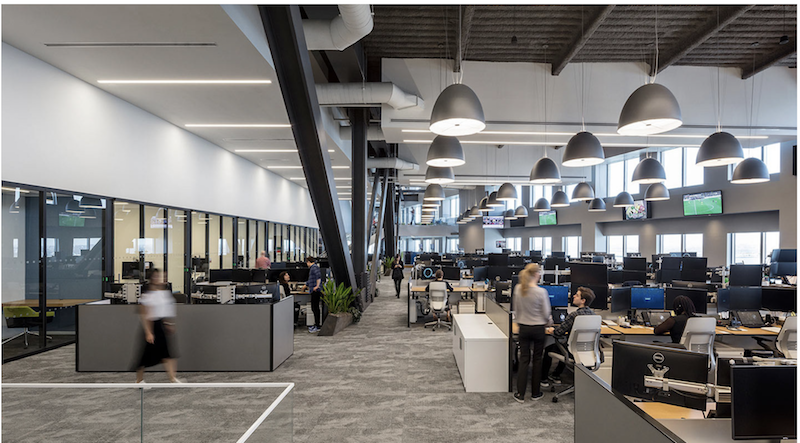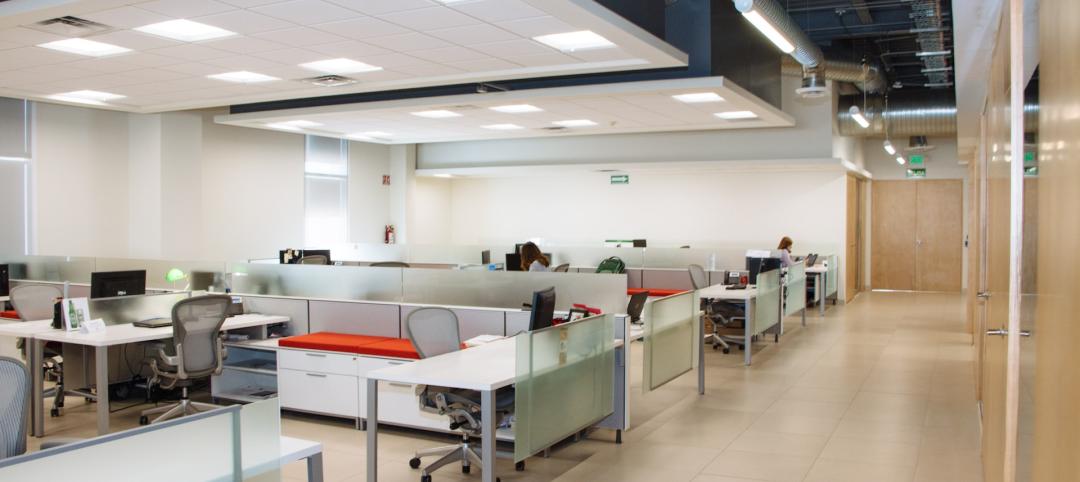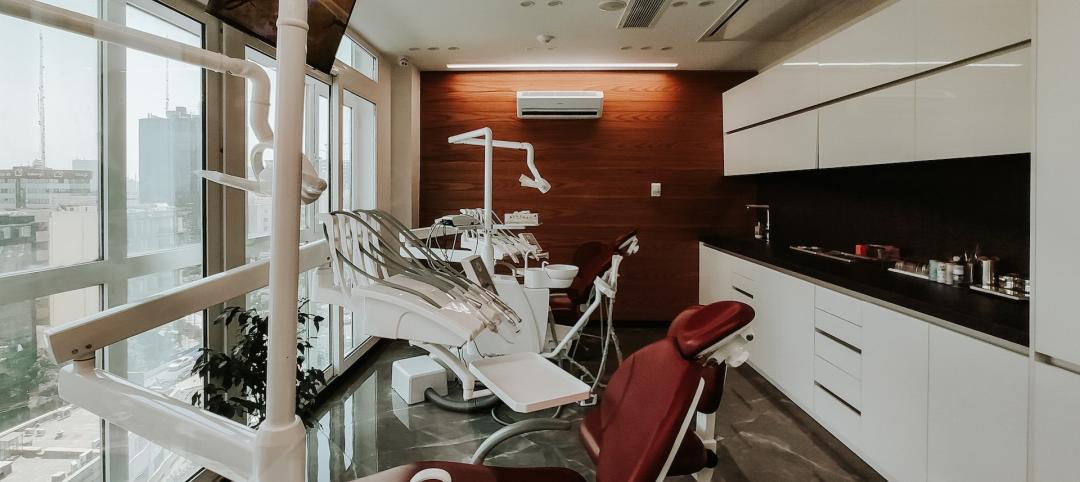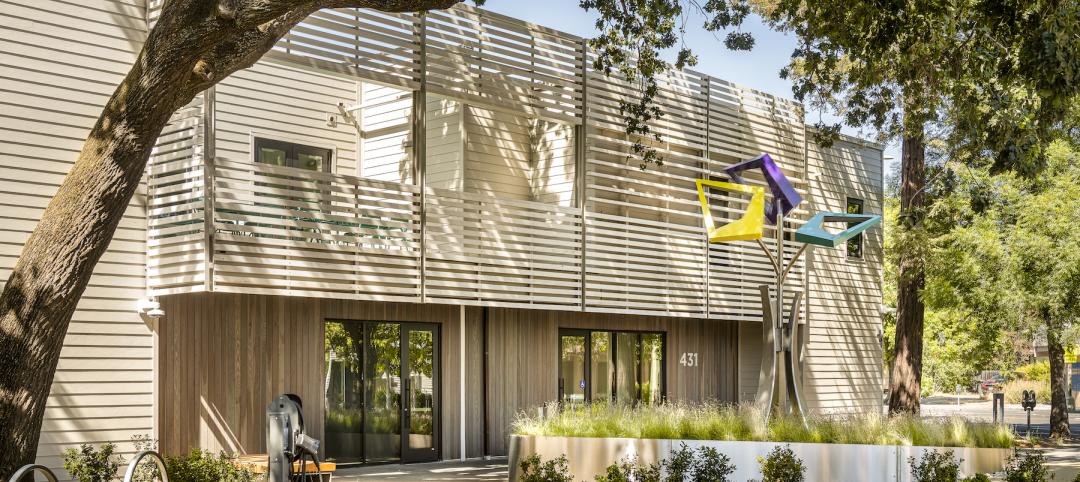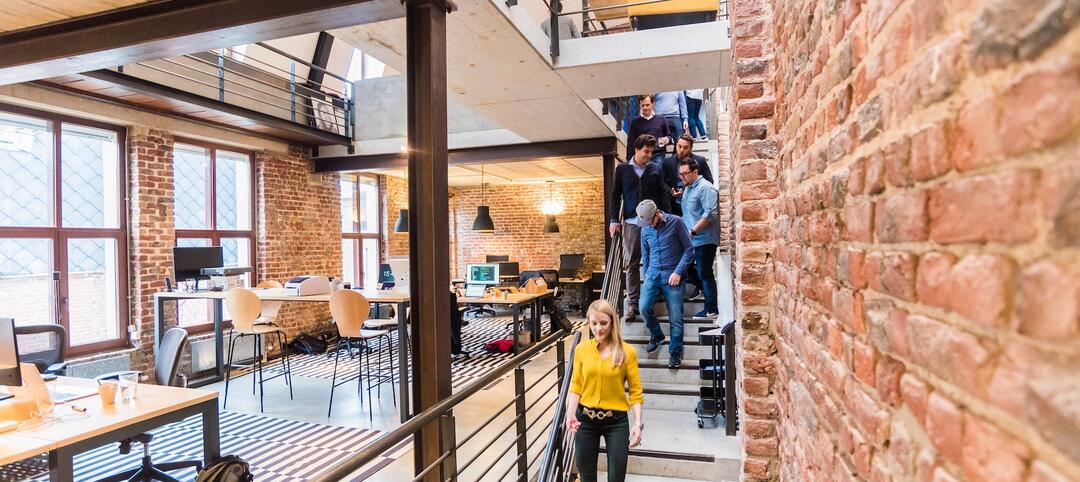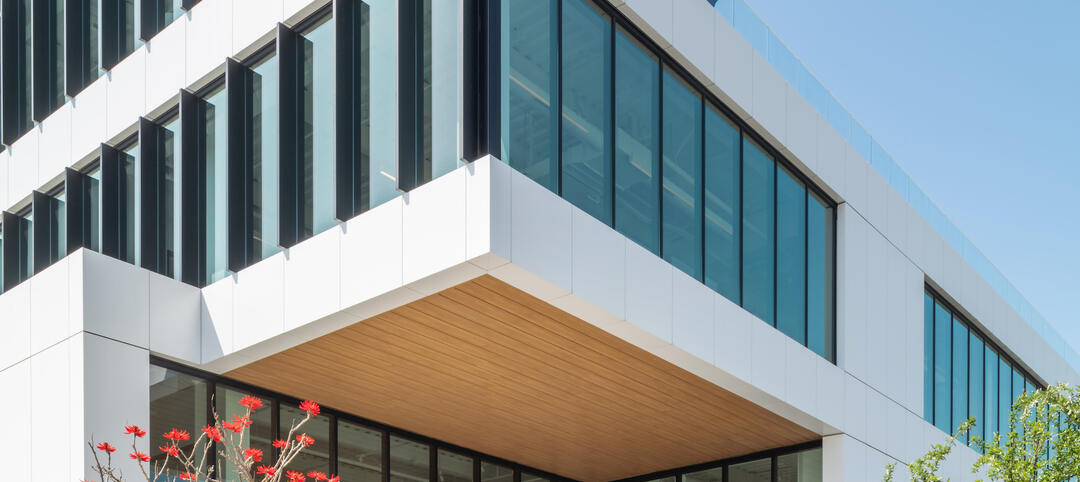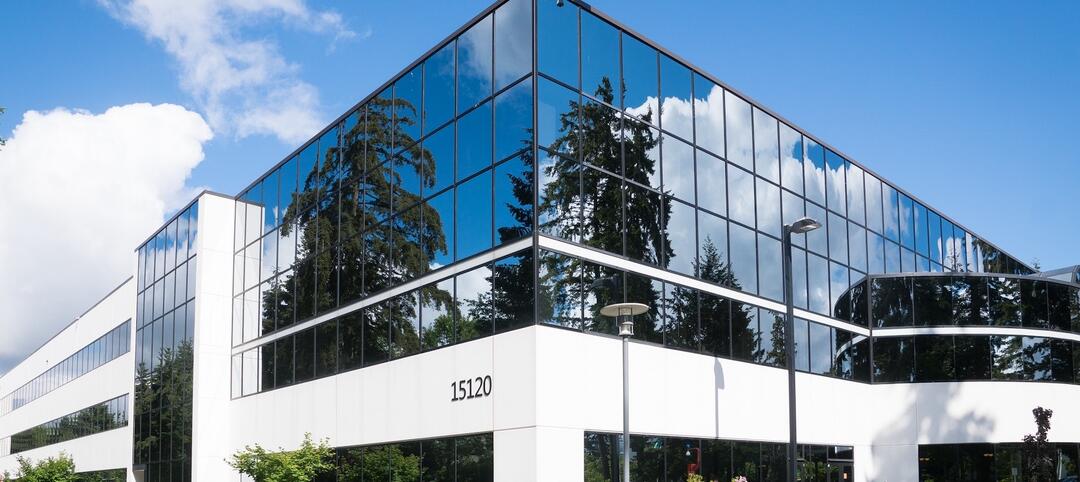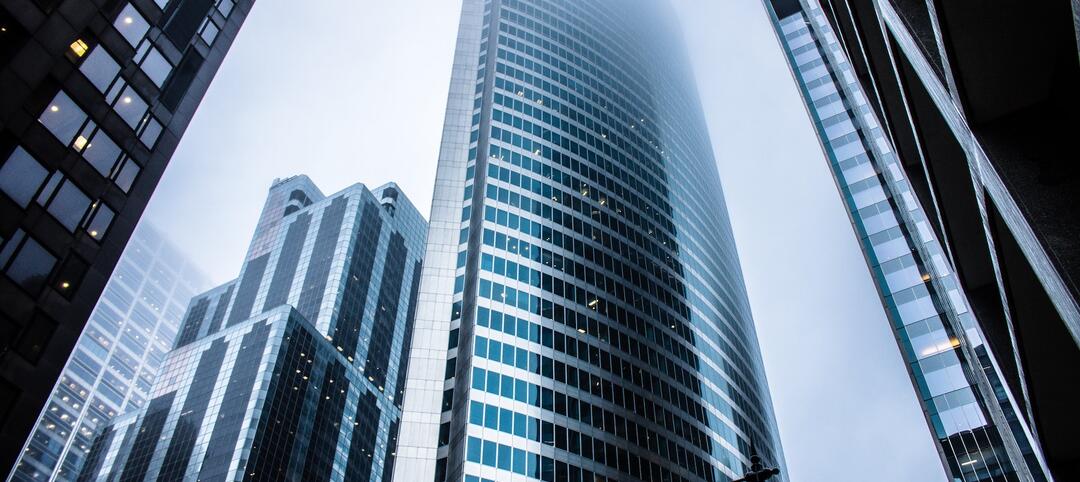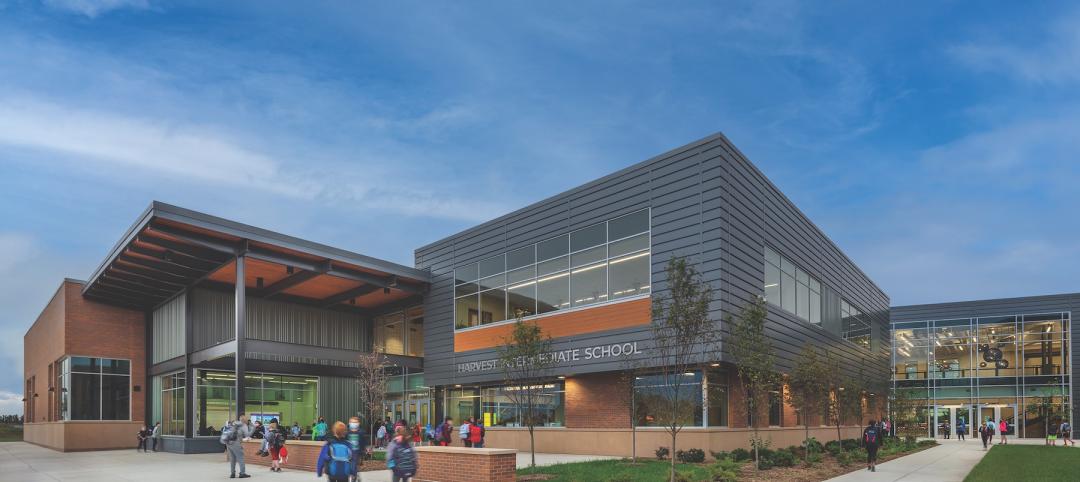More evidence that companies are embracing open workplace environments comes from Ted Moudis Associates, a New York-based architectural and design firm, whose 2018 Workplace Report finds that offices are being designed to accommodate collaborative “activity-based” projects.
This report, the firm’s third in as many years, encompasses data from 31 projects in the U.S. with 3.1 million sf of rentable space, 2.5 million of usable space, and 15,546 workspaces. While the average usable square footage per seat remained consistent at 165 sf, 54% of the total seats were allocated for “alternative” (i.e., non-assigned), collaborative, or amenity seating.
Nearly one quarter of the employees in projects that Ted Moudis analyzed—especially those working for digital media and technology companies—participate in activity-based working, meaning that they roam the office on a daily basis. Activity-based work environments average 177 sf per seat last year (versus 163 sf/seat in 2016), 1.3 seats per employee, and 131 sf per person (vs. 124 sf the previous year).
The study states that usable square footage per seat in activity-based working environments rose by 14 points to a total two-year gain of 18 points. “This suggests that we have reached the limits of office density,” the study concludes.
Here’s a breakdown by company type:
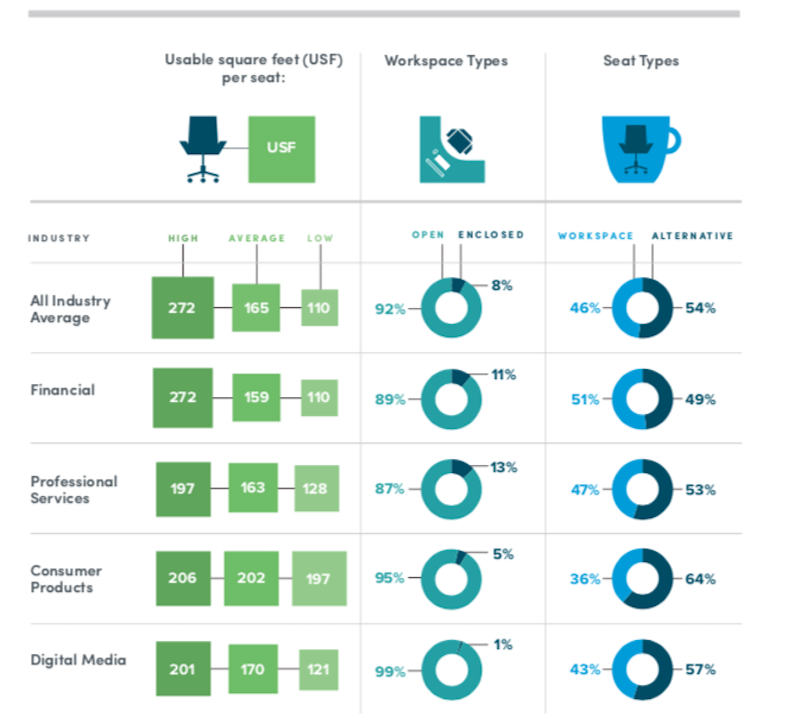
“This is a really exciting time to be in workplace,” notes Jamie Feuerborn, Director of Workplace Strategy at Ted Moudis Associates. “Executive leaders are competing [with] other organizations across all industries to recruit the best and brightest talent and have come to realize the value the physical workplace brings. As a result, we have seen a larger investment in workplace strategy and change management services to help create the right balance between their culture, productivity, and employee experience.”
See Also: A cost guide to office fit-outs provides comparisons for 59 markets
Progressive workplace concepts “have increasingly become best practices and virtually all organizations are implementing some, if not all, of them,” the study stated. The number of clients that are adopting benching increased by 7% over 2017, to where 75% of open workspaces are desking/benching.
Of the 54% of workspace seats that are alternative, 71% are being used within meeting spaces (the vast majority of which within an open floor design), 23% for amenity seats (such as cafés), and 6% are “focus” seats that are in enclosed areas free from auditory and visual distractions.
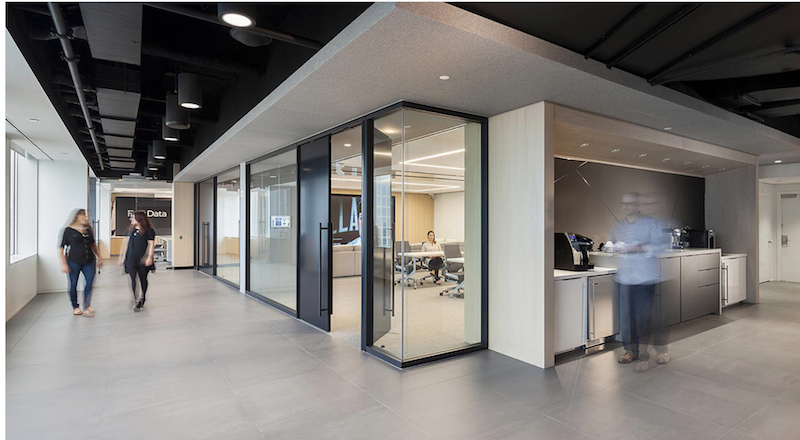
Enclosed spaces in offices are typically reserved for meetings and privacy. Image: Ted Moudis Associates
The study finds a strong inclination toward consolidating café space to include meeting areas. (Amenities are now viewed as “destinations,” the report stated) More often than not, offices are also being designed to support mental and physical opportunities for employees. Wellness space now includes prayer rooms, nap rooms, game rooms, and fitness centers.
The projects analyzed average one wellness space per 173 employees in 2017, vs. one per 198 employees the previous year. And as companies become more paperless, there’s less space allocated for equipment like copier machines, which average one for every 83 employees, vs. one for every 73 in 2016.
In the future Ted Moudis Associates will track its predictions that there will be an increase in semi-enclosed and small focus rooms, fewer executives suites, an increase activity-based seating, and an increase in amenity and wellness spaces.
Related Stories
Giants 400 | Oct 6, 2022
Top 50 Medical Office Building Engineering + EA Firms for 2022
Jacobs, Gresham Smith, KPFF Consulting Engineers, and IMEG Corp. head the ranking of the nation's largest medical office building (MOB) engineering and engineering/architecture (EA) firms for 2022, as reported in Building Design+Construction's 2022 Giants 400 Report.
Giants 400 | Oct 6, 2022
Top 100 Medical Office Building Architecture + AE Firms for 2022
CannonDesign, Perkins Eastman, HGA, and E4H Environments for Health Architecture top the ranking of the nation's largest medical office building (MOB) architecture and architecture/engineering (AE) firms for 2022, as reported in Building Design+Construction's 2022 Giants 400 Report.
Green | Oct 5, 2022
In California, a public power provider’s new headquarters serves as a test case for an innovative microgrid and for reducing greenhouse gas emissions
Sonoma Clean Power (SCP), the public power provider for California’s Sonoma and Mendocino Counties, recently unveiled its new all-electric headquarters.
| Sep 23, 2022
Central offices making a comeback after pandemic
In the early stages of the Covid pandemic, commercial real estate industry experts predicted that businesses would increasingly move toward a hub-and-spoke office model.
| Sep 20, 2022
New Long Beach office building reflects Mid-Century Modern garden-style motif
The new Long Beach, Calif., headquarters of Laserfiche, a provider of intelligent content management and business process automation software, was built on a brownfield parcel previously considered undevelopable.
| Sep 6, 2022
Demand for flexible workspace reaches all-time high
Demand for flexible workspace including coworking options has never been higher, according to a survey from Yardi Kube, a space management software provider that is part of Yardi Systems.
| Sep 2, 2022
Converting office buildings to apartments is cheaper, greener than building new
Converting office buildings to apartments is cheaper and greener than tearing down old office properties and building new residential buildings.
Mass Timber | Aug 30, 2022
Mass timber construction in 2022: From fringe to mainstream
Two Timberlab executives discuss the market for mass timber construction and their company's marketing and manufacturing strategies. Sam Dicke, Business Development Manager, and Erica Spiritos, Director of Preconstruction, Timberlab, speak with BD+C's John Caulfield.
Giants 400 | Aug 22, 2022
Top 90 Construction Management Firms for 2022
CBRE, Alfa Tech, Jacobs, and Hill International head the rankings of the nation's largest construction management (as agent) and program/project management firms for nonresidential and multifamily buildings work, as reported in Building Design+Construction's 2022 Giants 400 Report.
Giants 400 | Aug 22, 2022
Top 200 Contractors for 2022
Turner Construction, STO Building Group, Whiting-Turner, and DPR Construction top the ranking of the nation's largest general contractors, CM at risk firms, and design-builders for nonresidential buildings and multifamily buildings work, as reported in Building Design+Construction's 2022 Giants 400 Report.


